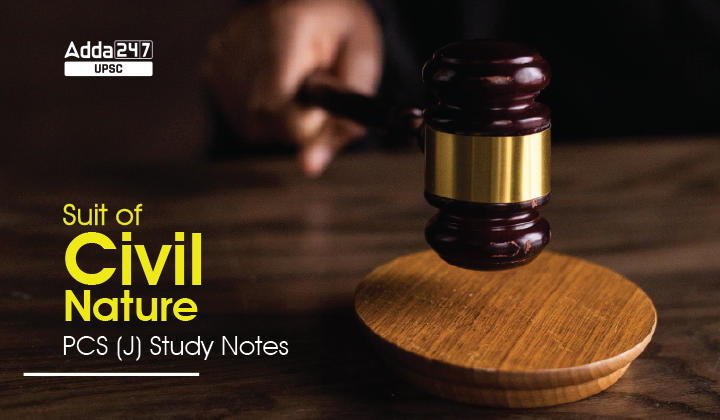Table of Contents
Suit of Civil Nature
The character of the suit is determined by whether or not the primary issue involves the enforcement or protection of a civil right. A civil suit is one that involves a citizen’s private rights and duties. When the central issue is one of religion or caste, the case cannot be considered civil.
Courts with jurisdiction over civil matters hear and decide cases involving private parties. Having the appearance of a court isn’t enough; a legitimate judicial body should also be equipped to hand down a ruling that will stand the test of time. According to Article 9 of the Civil Procedure Code, the Civil Courts have jurisdiction over any suits that are not criminal in nature and are not prohibited by the CPC. Hence, a civil court can try a case if –
The suit in the question is of a civil nature
The cognizance of the suit is not expressly or impliedly barred by any other statute
Unfortunately, the Code provides no clear explanation of what exactly constitutes a civil complaint. Generally speaking, a civil litigation is a lawsuit that is not criminal in character. A civil suit is a legal proceeding wherein the issue at hand is one of a person’s civil rights. A civil action is a legal process aimed at resolving a dispute over personal or property rights.
The Supreme Court ruled in Bhatia coop. housing society vs. D. C. Patel, AIR 1953 SC, that the civil court has the authority to choose its own jurisdiction. When deciding whether or not to hear a civil case, a court will look at whether or not the plaintiff is seeking to enforce his or her private rights, such as the right to property, the right to worship, the right to share in offerings, damages for civil wrongs, particular performance of contracts, damages for breach of contracts, specific relief, restoration of conjugal rights, restitution of rent, restitution of salary, etc. Lawsuits of this kind are examples of civil litigation.
नागरिक प्रकृति का सूट
सूट का चरित्र इस बात से निर्धारित होता है कि प्राथमिक मुद्दे में नागरिक अधिकार का प्रवर्तन या संरक्षण शामिल है या नहीं। दीवानी वाद वह होता है जिसमें नागरिक के निजी अधिकार और कर्तव्य शामिल होते हैं। जब केंद्रीय मुद्दा धर्म या जाति का हो तो मामले को दीवानी नहीं माना जा सकता।
दीवानी मामलों पर अधिकार क्षेत्र वाले न्यायालय निजी पक्षों से जुड़े मामलों की सुनवाई और निर्णय लेते हैं। अदालत में पेश होना ही काफी नहीं है; एक वैध न्यायिक निकाय को भी समय की कसौटी पर खरा उतरने वाला निर्णय देने के लिए सुसज्जित किया जाना चाहिए। सिविल प्रक्रिया संहिता के अनुच्छेद 9 के अनुसार, सिविल न्यायालयों के पास ऐसे किसी भी मुकदमे पर अधिकार क्षेत्र है जो आपराधिक प्रकृति के नहीं हैं और सीपीसी द्वारा निषिद्ध नहीं हैं। इसलिए, एक दीवानी अदालत किसी मामले की सुनवाई कर सकती है यदि –
प्रश्न में वाद नागरिक प्रकृति का है
सूट का संज्ञान किसी अन्य क़ानून द्वारा स्पष्ट रूप से या निहित रूप से वर्जित नहीं है
दुर्भाग्य से, संहिता इस बात का कोई स्पष्ट स्पष्टीकरण नहीं देती है कि वास्तव में एक नागरिक शिकायत क्या है। सामान्यतया, एक दीवानी मुकदमा एक ऐसा मुकदमा है जो चरित्र में आपराधिक नहीं है। एक दीवानी मुकदमा एक कानूनी कार्यवाही है जिसमें हाथ में मुद्दा एक व्यक्ति के नागरिक अधिकारों में से एक है। एक नागरिक कार्रवाई एक कानूनी प्रक्रिया है जिसका उद्देश्य व्यक्तिगत या संपत्ति के अधिकारों पर विवाद को हल करना है।
भाटिया कॉप में सुप्रीम कोर्ट का फैसला। हाउसिंग सोसाइटी बनाम डी.सी. पटेल, एआईआर 1953 एससी, कि सिविल कोर्ट को अपना अधिकार क्षेत्र चुनने का अधिकार है। एक दीवानी मामले की सुनवाई करने या न करने का निर्णय करते समय, एक अदालत यह देखेगी कि वादी अपने निजी अधिकारों को लागू करने की मांग कर रहा है या नहीं, जैसे कि संपत्ति का अधिकार, पूजा का अधिकार, प्रसाद में हिस्सा लेने का अधिकार, सिविल गलतियों के लिए हर्जाना, अनुबंधों का विशेष प्रदर्शन, अनुबंधों के उल्लंघन के लिए हर्जाना, विशिष्ट राहत, वैवाहिक अधिकारों की बहाली, किराए की बहाली, वेतन की बहाली, आदि। इस तरह के मुकदमे सिविल मुकदमेबाजी के उदाहरण हैं।


 UPSC Prelims Exam Date 2024, Check New E...
UPSC Prelims Exam Date 2024, Check New E...
 UPSC Eligibility Criteria 2024- Age Limi...
UPSC Eligibility Criteria 2024- Age Limi...
 UKPSC RO ARO Result 2024 Out, Download M...
UKPSC RO ARO Result 2024 Out, Download M...







